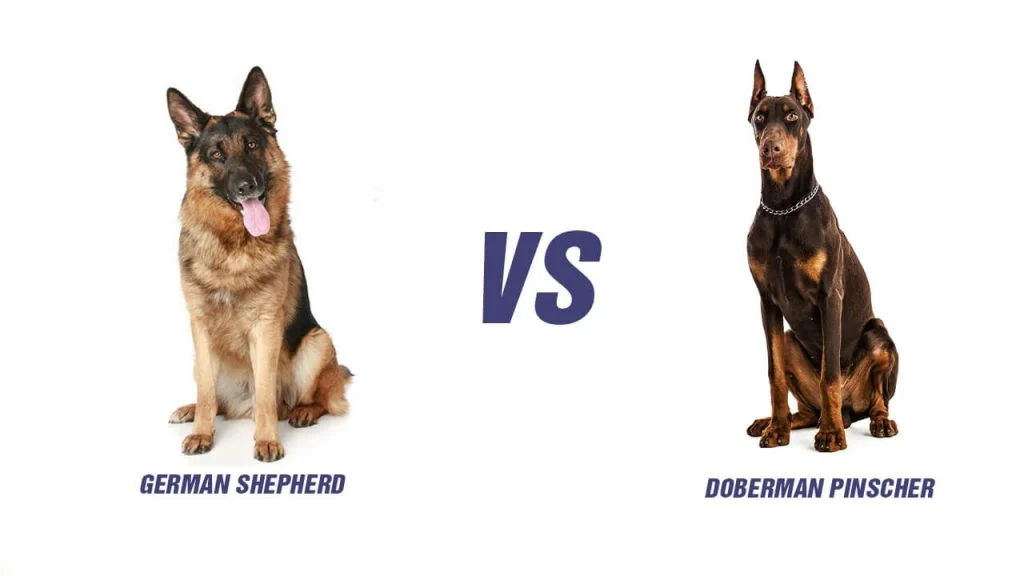Differences between German Shepherds and Dobermans: When it comes to choosing a guard dog, most people narrow their choices down to two breeds: German Shepherds and Dobermans. Both breeds are known for their loyalty, intelligence and protection, but there are some important differences between them.
Differences between German Shepherds and Dobermans
When it comes to choosing a loyal and protective companion, most people narrow their choices down to two popular breeds: the German Shepherd and the Doberman Pinscher.
Both breeds are known for their intelligence, loyalty and courage, but there are also some important differences between them that potential owners should be aware of.
Here are 7 key differences between German Shepherds and Dobermans:
1. Size and structure
One of the most obvious differences between these two species is their size and structure. German Shepherds are large dogs, with males averaging 24-26 inches in height and females 22-24 inches. They have a strong, muscular build and weigh anywhere from 50-90 pounds.
Dobermans, on the other hand, are smaller and leaner, with males averaging 26-28 inches in height and females 24-26 inches. They usually weigh between 60-80 pounds.
2. Coat and coloring
Another difference between German Shepherds and Dobermans is their coat and color. German Shepherds have a dense, double coat consisting of a dense, outer hair and a soft, downy undercoat. The outer coat is straight or wavy and is usually black and tan, although white, liver and blue varieties also exist.
Also Read: Smegma Removal and Treatment: How to Clean Dog Smegma by Yourself
Dobermans have a short, sleek coat that is usually black, red, fawn or blue. Some Dobermans have small amounts of white on their chest and/or toes.
3. Shedding
Because German Shepherds have a double coat, they shed moderately throughout the year. This shedding increases as the dog “blows out” its coat in preparation for the changing seasons of spring and fall.
Dobermans, on the other hand, are considered “low-shedding” dogs. This means that they shed very little hair throughout the year, although they may go through a period of heavy shedding once or twice a year.
4. Disposition
When it comes to temperament, both German Shepherds and Dobermans are loyal, protective and intelligent breeds. However, there are some important differences to be aware of.
German Shepherds are generally very good with children and other pets, as long as they are properly socialized from a young age. They are also known to be very trainable and obedient, which makes them ideal for many types of work, including law enforcement, search and rescue, and assistance dogs.
On the other hand, Dobermans are generally not good with children or other pets. They are very loyal and protective of their family, but their natural wariness of strangers makes them suspicious and aloof with strangers. Dobermans are also highly intelligent and trainable, but their independent nature means they need a firm, steady hand when it comes to training.
5. Exercise requirements
German Shepherds and Dobermans need plenty of exercise to stay healthy and happy. However, their exercise needs differ in some important ways.
German Shepherds require moderate exercise, which means they can live happily in both urban and rural environments. A daily walk or play session is usually enough to meet their needs.
Dobermans, on the other hand, are very high-energy dogs that need a lot of exercise to stay happy and healthy. They usually do best in rural environments where there is plenty of room to run and play. Dobermans living in urban areas can often become bored and destructive if not exercised enough.
6. Health problems
Both German Shepherds and Dobermans are generally healthy breeds, but there are some health issues to be aware of.
German Shepherds are prone to hip and elbow dysplasia, a condition that can cause arthritis and lameness. They are also prone to bloating, a life-threatening condition that occurs when the stomach becomes distended and filled with gas.
Dobermans are also prone to hip and elbow dysplasia, as well as bloat. They are also at risk for a condition called von Willebrand’s disease, a disorder that affects the blood’s ability to clot.
7. Life expectancy
The last key difference between German Shepherds and Dobermans is their life expectancy. German Shepherds typically live 10-12 years, while Dobermans have a life expectancy of 9-11 years.
When it comes to choosing a loyal and protective companion, both German Shepherds and Dobermans make excellent choices. However, there are some important differences between these two breeds that potential owners should be aware of. By understanding these differences, you can ensure that you choose a breed that fits your lifestyle and needs.
German Shepherds Vs Dobermans: Which Breed is right for you?

There are a number of factors to consider when choosing between German shepherd and Doberman as your breed of choice.
German shepherds are known for being loyal, protective, and intelligent, while Dobermans are known for being alert, obedient, and fearless. Both breeds make excellent guard dogs and are excellent with children.
However, German shepherds are generally more expensive to purchase and care for than Dobermans. When it comes to choosing the right breed for you, it is important to consider your lifestyle and needs. If you are looking for a loyal and protective companion, a German shepherd may be the right choice for you.
If you are looking for a less expensive option that is still an excellent guard dog, a Doberman may be the better choice.

